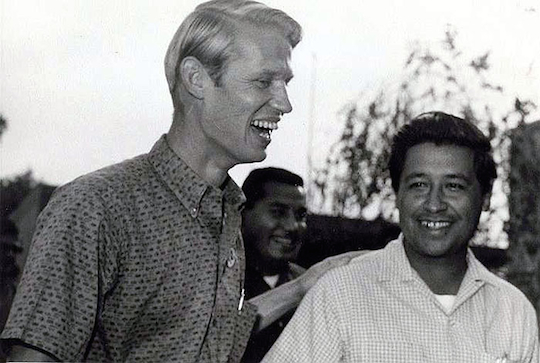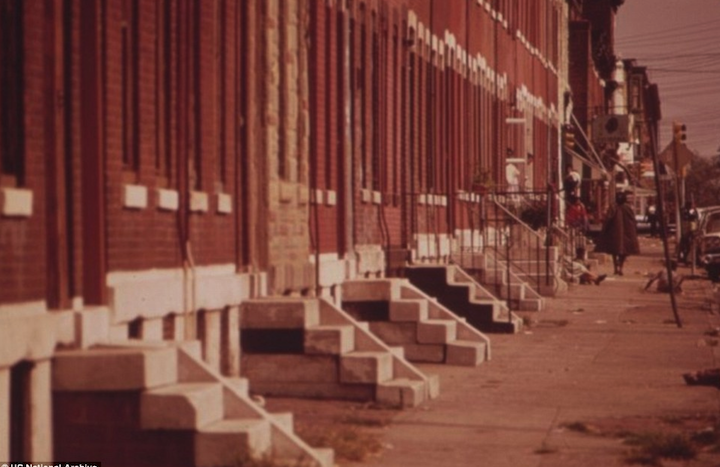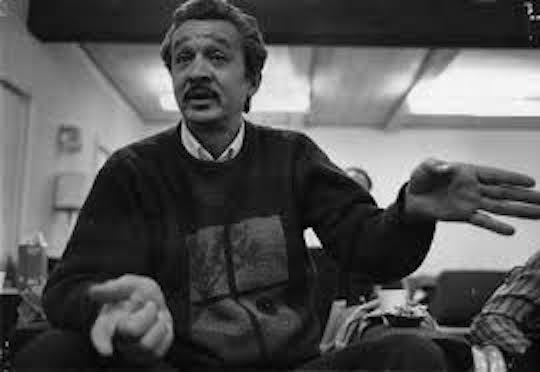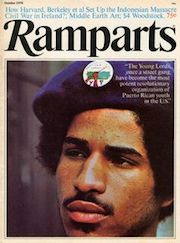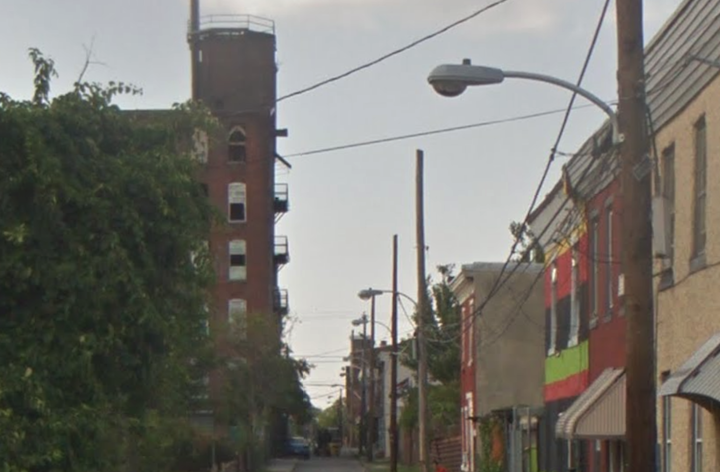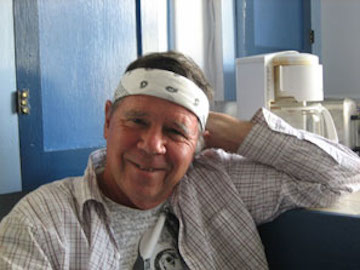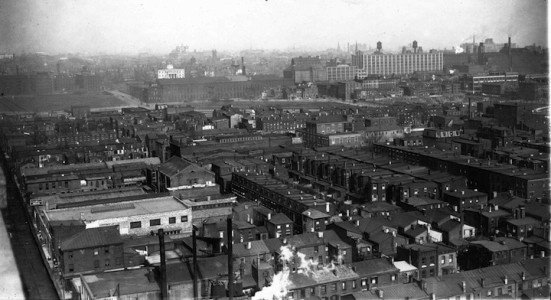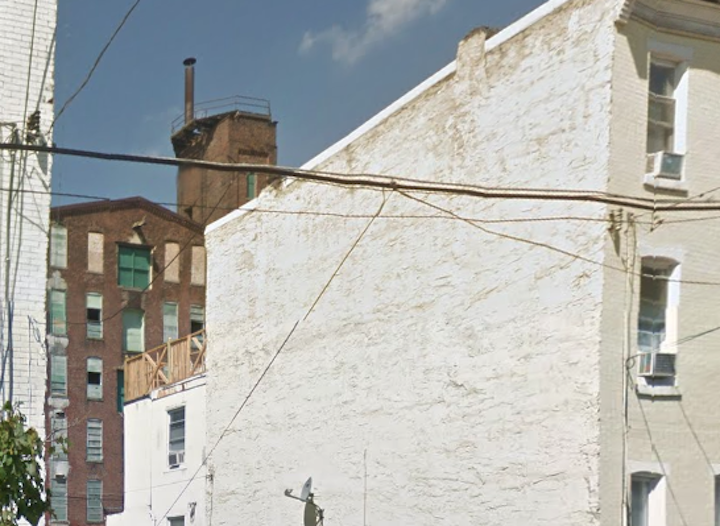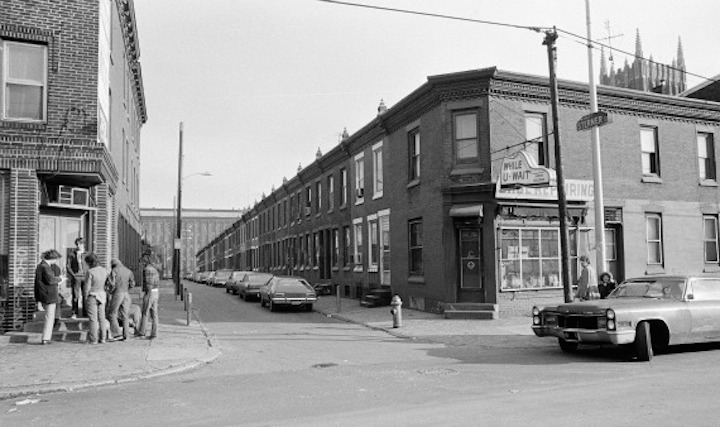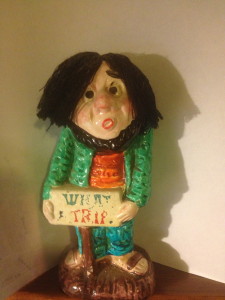Gabby worked on the United Farm Workers grape boycott in Philadelphia from the fall of 1969 until August, 1970. I met him in the fall of 1969 in West Philadelphia and we became fast friends. We had both been in Delano in the summer of 1968 but somehow did not know each other.
For him, the grape boycott in Philadelphia was exile. An indiscretion in his love life landed him in hot water with Cesar. Only the intervention of Gabby’s lawyer boss with Cesar’s henchman kept Gabby from being fired.
He was sentenced to the grape boycott in Philadelphia. North Philadelphia to be more specific, Kensington to be more specific, and 2536 North Mascher Street to be most specific.
Gilbert Padilla was running the boycott in Philadelphia, along with Esperanza (Hope) Lopez, who was burned out and longing to return to California. Gabby and I were among at least 20 staff living and working out of the house. We had many picket lines at supermarkets every day.
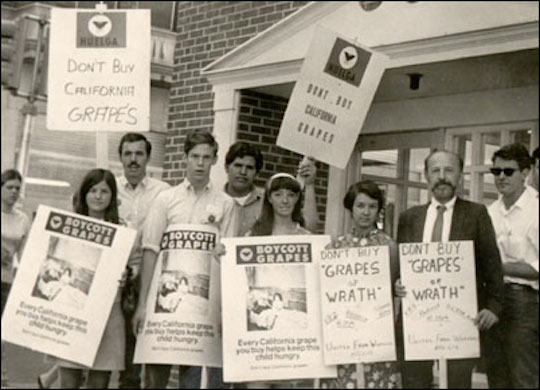
I am third from the left. We appear to be at the Penn Fruit in Haverford. I have no memory of this moment.
At night we’d line up our picket lines for the next day and then relax. Here Gabby describes life on the roof.
After we’d all managed to make our calls to supporters for the next day’s picket lines we would generally retire to the roof in the company of a handful of Young Lords who’d show up most nights (after picketing with us all day) to help us, they said, get things “a little bit mo’ relaxed.”
The roof – up on our roof which by July was Hanging Gardens of Babylon, wonderful retreat and eventually sleeping place for some of us as things just got too crowded and hot and humid in the house with more and more people and children it seemed.
From our flat roof you could see the devastation of the inner city slum, the vacant lots with brick and trash, sumac trees pushing brave, a seven-story brick factory two blocks away and during breaks the workers would come out and look down on our Mascher Street world, surveying.
Duck (don’t ask) was the genius and muscle behind the transformation of the roof. Beginning with the first warm days of spring, he began carrying pots, cans, old drawers, wood boxes – anything – and then load after load of dirt from the country up to the roof and then he discovered the piles of dry nitrogen-rich treated sewage at Haverford College and let me tell you that was great free fertilizer. In the pots cans boxes and drawers he began planting flowers, vegetables, and a marijuana plant or two so that when June came the borders of the roof were practically all window boxes with stalks of corn or fresh tomatoes or marigolds or petunias or dope plants. Over a spring and summer of keeping an eye on promising suburban trash piles and then the Haverford College dump (thanks Haverford!), Duck (don’t ask) had found and hauled up to the roof a beautiful old if slightly worn oriental rug which spread over the whole roof nicely hid the tar paper, and on which he put pillows also scavenged.
A paradise on earth! The roof was a place for a special meal to celebrate nothing but the goodness of the day. I remember one meal specially, a windy, gusty free day towards evening with the summer day crystal clear city, a beautiful sunset in the west that was our best unobstructed view, winds fresh and crisp and magic in the air no denying, a good dinner kidding around with each other, sipping wine sitting cross-legged on pillows watching our city in this summer twilight with winds evening.
The roof too was parties, beginning after working finished at ten or so, the Young Lords coming over most nights like I said, a big group of us pretty quiet up there, the street noises, yes, maybe we had a radio or music from the Puerto Ricans next door, drinking wine and smoking grass and the Young Lords giving each other six-inch punches. We had to be careful or a Young Lord would roll over the edge of the roof down three stories to the alley below. In fact, I remember – we had a Parallel Patrol each night, somebody (usually me) whose job it was to stay sober slash straight and keep the rest of the group parallel to the roof and to discourage anybody from practicing the lost art of walking too close to the edge of the roof. Me, though, I didn’t indulge, instead savoring the city different at night, lights twinkling, less hard but for the sirens, just sitting on our roof enjoying summer night, happy with our friendship and the sense of impending victory and the sweet smell of marijuana. Cooler later, stars and skies, sumac trees and sirens, gun shots and breezes – oh my!
And the roof was for sleeping, just too hot in the house, too many of us as the summer goes, too few rooms, and the roof invites. At midnight when the party winds down we roll out sleeping bags and the children in the neighbor’s house think us fools for sleeping up there, thrilled though, the little girls watch us white undies against their blackness and the night, dancing along to the Supremes on the radio or their roof five feet separated from ours, singing along.
We sleep, waking in the morning with the Philadelphia summer sun and the factory workers who have worked graveyard are out on their balcony fire escapes smoking, watching us in our bags on our roof, a good place to sleep we figure but totally nuts, I’d guess, to them.
I showed these photos and Gabby’s writing to my friend. “A long time ago. Far away. A dream we dreamed one afternoon long ago?”
I acknowledged the Grateful Dead allusion and pressed for his impression of the writing and photos. He slipped off into a digression about a space ship house that he remembered from his visit to Philadelphia in 1970, but I wasn’t going there. What about the roof on Mascher Street?


